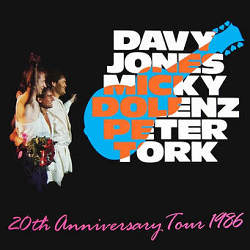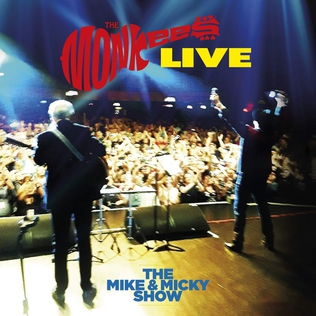
The Monkees were an American pop rock band formed in Los Angeles in the mid-1960s. The band consisted of Micky Dolenz, Davy Jones, Michael Nesmith, and Peter Tork. Spurred by the success of the television show of the same name, the Monkees were one of the most successful bands of the late 1960s. With international hits, four chart-topping albums and three chart-topping songs, they sold more than 75 million records worldwide.

Pisces, Aquarius, Capricorn & Jones Ltd. is the fourth album by the Monkees. It was released on November 6, 1967, during a period when the band exerted more control over their music and performed many of the instruments themselves. However, although the group had complete artistic control over the proceedings, they invited more outside contributions than on their previous album, Headquarters, and used session musicians to complement their sound. The album also featured one of the first uses of the Moog synthesizer in popular music. Pisces, Aquarius, Capricorn & Jones Ltd. sold over three million copies. It was the band's fourth consecutive album to reach No. 1 on the U.S. Billboard 200.

Headquarters is the third studio album by the American pop rock band the Monkees, released in 1967 by Colgems Records. It was issued after the first season of their television series had concluded and was the first album on which the group members made substantial songwriting and instrumental contributions, rather than relying on session musicians and professional songwriters. After a struggle for creative autonomy with their record label, the group had been allowed, to a degree, to record by themselves. Headquarters became the group's third consecutive No. 1 album on the Billboard 200 chart and was certified double platinum in the United States with sales of more than two million copies within the first two months of release. It also peaked at No. 2 on the UK charts. It is included in the 2006 book 1001 Albums You Must Hear Before You Die.

The Monkees Present is the eighth studio album by the American pop rock band the Monkees, released in 1969 by Colgems Records. It was the second Monkees album released after the departure of Peter Tork and the last to feature Michael Nesmith until 1996's Justus.

Changes is the ninth studio album by the American pop rock band the Monkees, released in 1970 by Colgems Records. The album was issued after Michael Nesmith's exit from the band, leaving only Micky Dolenz and Davy Jones to fulfill the recording contract they had signed in the mid-1960s. Changes was their last new album for Colgems Records and the group's last album of all new material until Pool It!, released in 1987.

Pool It! is the tenth studio album by American pop rock band the Monkees, released in August 1987 by Rhino Records. It was the first Monkees studio album of new material since Changes in 1970 and the first Monkees album to feature Peter Tork since the 1968 Head soundtrack.

The Birds, the Bees & the Monkees is the fifth studio album by the American pop rock band the Monkees, released in 1968 by Colgems Records. It was the first album released after the cancellation of their TV show and subsequently was their first not to reach No. 1 on the U.S. Billboard 200, peaking at No. 3, and their first not to chart in the UK, with their four previous efforts all having reached the top ten. The album has sold over a million copies.

Head is the sixth studio album by the American pop rock band the Monkees, released in 1968 by Colgems Records, and the soundtrack to the film of the same name. The album primarily consists of musique concrète pieces assembled from the film's dialogue, while the six new songs encompass genres such as psychedelic music, lo-fi, acid rock and Broadway theatre.

Instant Replay is the seventh studio album by the American pop rock band the Monkees, released in 1969 by Colgems Records. Issued 11 months after the cancellation of the group's NBC television series, it is also the first album released after Peter Tork left the group and the only album of the original nine studio albums that does not include any songs featured in the TV show.

"Daydream Believer" is a song composed by American songwriter John Stewart shortly before he left the Kingston Trio. It was originally recorded by the Monkees, with Davy Jones singing the lead. The single reached No. 1 on the U.S. Billboard Hot 100 chart in December 1967, remaining there for four weeks, and peaked at No. 5 on the UK Singles Chart. It was the Monkees' third and last No. 1 hit in the U.S.

"Valleri" is a song written by Tommy Boyce and Bobby Hart for the Monkees. The single peaked at #3 on the Billboard Hot 100 and spent two weeks at #1 on the Cash Box chart in early 1968, and reached #1 in Canada and #12 in the UK.
"Daily Nightly" is a song by Michael Nesmith of the Monkees, which appeared on their fourth album, Pisces, Aquarius, Capricorn & Jones Ltd., in 1967, and was featured in two second-season episodes of their television series, "A Fairy Tale" and "Monkees Blow Their Minds".

Live 1967 is a live album by the American pop rock band the Monkees, released in 1987 by Rhino Records. The album was compiled from show dates in Seattle, Portland and Spokane on their 1967 United States tour. The songs mostly feature the Monkees themselves singing and playing, although the "solo spots" for each member feature music by opening act the Sundowners.
"Star Collector" is a song written by Gerry Goffin and Carole King in 1967 and recorded by The Monkees. The song is included on their fourth album Pisces, Aquarius, Capricorn & Jones Ltd. It was featured in five second-season episodes of their television series: "The Wild Monkees", "Hitting the High Seas", "Monkees Watch Their Feet", "Monkees in Paris" and "Monkees Mind Their Manor". "The Wild Monkees" uses an early mix of the song, and the other episodes use the released mix.

Summer 1967: The Complete U.S. Concert Recordings is a four-CD compilation of live recordings by the American pop rock band the Monkees, released in 2001 by Rhino Handmade. Recorded during the band's summer 1967 tour, the CD was a limited edition release, with 3,500 copies being made available. 16 of these tracks had previously been compiled by Rhino and released as Live 1967 in 1987.

The Headquarters Sessions is a compilation album by the American pop rock band the Monkees, released in 2000 by Rhino Handmade. It contains 84 tracks on three CDs, including 60 previously unreleased recordings from the sessions that produced the band's third album, Headquarters (1967).
"Zor and Zam" is a song written by Bill and John Chadwick and recorded by The Monkees for their 1968 album The Birds, The Bees & The Monkees. It was also featured in the final episode of season 2 of the band's popular television series, entitled "The Frodis Caper". The song involves the preparations for a war between two monarchs of rival kingdoms; however, when it comes time to fight, no one shows up and the war never happens.

20th Anniversary Tour 1986 is a live album by the Monkees recorded during their 20th anniversary tour in 1986. To date, it is the only known complete concert recorded during this era. The recording was available at 1987 tour stops in double-LP and cassette formats, though a planned 1988 retail release by Rhino Records was ultimately scrapped. The record credited the artists as Davy Jones, Micky Dolenz, Peter Tork to avoid paying royalties to Arista Records who owned the Monkees trademark at the time, though the band's logo is visible on the sleeve. A limited-edition CD was released in 1994 under the title Live! by the group's fan club in Nashville, and was sold at concerts during their 1996 tour.

"Goin' Down" is a song by the American pop rock band the Monkees, written by all four members of the group along with Diane Hildebrand. It was first released as the B-side to the "Daydream Believer" single on Colgems Records on October 25, 1967, in support of the band's fourth album, Pisces, Aquarius, Capricorn & Jones Ltd. The song managed to bubble under the Billboard Hot 100 upon its release.

The Monkees Live: The Mike and Micky Show is a 2020 live album by The Monkees, recorded in March and June 2019, during the band's successful tour. The concerts marked the first time that surviving Monkees Micky Dolenz and Michael Nesmith toured as a duo. The album is the first Monkees release following the death of Peter Tork in February 2019, and the final release to feature Nesmith prior to his December 2021 death.















